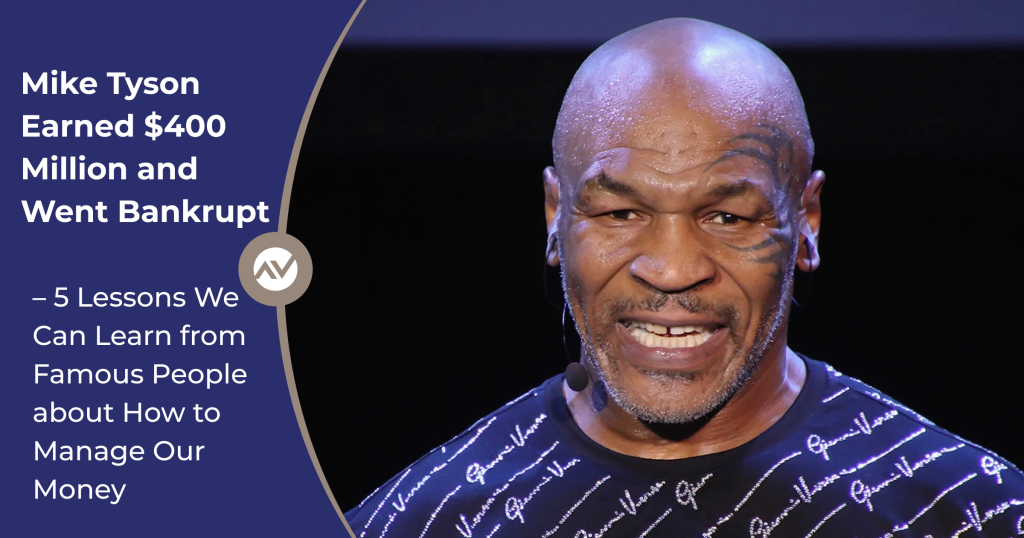
The Market
Mike Tyson Earned $400 Million and Went Bankrupt — 5 Lessons We Can Learn from Famous People about How to Manage Our Money
We are in the spotlight












Mike Tyson is one of the biggest names in professional boxing. The undisputed champion for half a decade and one of the greatest names in the heavyweight division for twenty years, his powerful punches and bullet-fast maneuvers have made him one of the most recognizable figures in sports. His world-shaking success netted him an unsurprising hundreds of millions in earnings, which is really unfortunate when you consider that he famously lost all of it nearly as quickly as he made it. Now, there are many nuances and details surrounding Mike Tyson’s career and personal life that informed the how’s and why’s that led to this outcome, and we can’t realistically cover all of it. Afterall, there have been entire books written on him. However, we can take away lessons not only from Mike Tyson, but other hyper-successful individuals who managed to lose extraordinary amounts of money. Though their lifestyles might feel entirely out of reach for the everyday person, and not every problem they have is relatable, we can look at people like Mike Tyson, Michael Jackson, Johnny Depp, and others to find recurring threads that appear in most, if not all success stories that came crashing down. "Many top tier athletes go bankrupt shortly after their careers are over, says David Kay, a financial advisor at LPL Financial," The key lesson to be learned: It’s not how much you make, it’s what you do with it that counts," David continued. Here are five lessons we can learn from famous people about how to manage our money. Or rather, how not to manage it. In our modern era and the fullness of social media saturating everyday life, we witness no shortage of people propping themselves up to create or maintain a certain image of themselves. The social value of one’s own reputation and brand is, for many, one of the most essential parts of how they’d define success. Nobody is fully immune to this, and it’s not a new thing, even if Facebook and TikTok have exacerbated society’s inherent struggles with vanity and appearance. Celebrities and public leaders have always struggled with this the most, as those with the spotlight have done everything possible to stay in that spotlight. Love and power are tantalizing motivations. When you receive so much of either, it’s hard to let them go. Wildly successful actor Nicholas Cage found himself staring down the barrel of financial ruin when, through a series of excessive purchases, he found himself down over $150 million dollars. That sum included a private island and 15 homes, many of which were purchased not out of need, or even want, but because on some psychological level, Cage needed to convince himself and the world that he was as successful and rich as everyone already thought he was. There was no room for him to look like anything less than a star actor.When a celebrity goes bankrupt, it can leave us quite in shock. How can a person lose so much money, when what we earn is a fraction of what they do? These are the biggest takeaways you can learn from Mike Tyson’s bankruptcy.
Going Bankrupt or Being Financially Healthy Lesson #1 - The Slow Implosion of Public Posturing

Not every situation in life leads to a happy ending. We understand that.
Let us help provide you with the resources to get your life back in order.
Obviously, most people cannot and should not be star actors, but that doesn’t mean that the core flaw exemplified by Cage’s overspending will never affect you. On a smaller level, this can be a middle-class store manager who chooses to buy a nice new car so they look cool to others, while barely scraping by on the rent of their 1-bedroom apartment. To the people they hang out with on Friday night, they only see the extravagant car, creating an impression of wealth and success that betrays reality. Yes, they appear cool to others, but the daily financial stress they experience rarely feels worth it. At a certain scale, “impulse purchases” don’t work quite the same way as they do for you and I. We might impulse buy a bunch of shoes off Amazon, or in-home gym equipment we don’t need, or a trip to Iceland. But you can’t impulse buy those things as you might, say, buy an entire town. That much money just doesn’t move that quickly. However, on the scale of wealth where people can entertain such purchases, it’s about as impulsive and reckless as you can get. Kim Basinger learned this the hard way when she decided it would be a fun investment to drop $20,000,000 on a town in her home state of Georgia and turn it into a glorified tourist attraction. For many reasons, this did not work, and she lost both her and her investors a lot of money, very quickly. Mike Tyson also wanted to flex his wealth by buying the Bengal Tigers. Sorry, we misspoke, that’s not *the* Bengal Tigers, but two actual, living Bengal tigers he could have as pets. Because why not? It was only a $250,000 expense — chump change for someone of Tyson’s caliber…but well, you read the intro of this piece. It’s hardly like he stopped there. Nobody is fully immune to impulse purchases, though we can train ourselves to be highly-resistant to them, and ultimately save ourselves a lot of money and stress in the long run. To be clear, falling for impulse purchases isn’t a moral failing. Companies pour millions of dollars into marketing teams with concerted efforts specifically designed to make you BUY RIGHT NOW, BEFORE IT’S TOO LATE. Today, the temptation is worse than ever, since the majority of retailers now offer an “after pay” layaway type solution. This means that even if you don’t have all the funds needed right now, you can pay later, usually in monthly installments. Sounds like a pretty good deal, until you find yourself stretching thin trying to make ends meet each month and putting yourself at risk for things that negatively impact your credit. But if you compulsively buy each impulse that swings your way, you’ll be looking at zeroes on your bank account sooner rather than later, and your novelty motorbike and newly renovated bathroom aren’t going to be of much help. We must cultivate discipline.Going Bankrupt or Being Financially Healthy Lesson #2 - Impulse Purchases are Dangerous

A financial advisor does more than just manage your money. They help you get your finances in order both for today and in the future.
Use AdvisorCheck to find the best financial advisor to help you get your life on track.
There is no end to the number of horrible mistakes people make, fueled by jealousy. And that’s not even counting the property destruction, defamation, infidelity, and other behaviors envy can inspire. To an extent, this point ties into our first point about social posturing. From private jets to prime LA real estate, often a high-profile member of our society will make a purchase of something just because someone else has it, and so they want it, too. The difference here is that, unlike when famous people buy things to uphold their public reputation, with envy, they buy things to close a perceived valley between themselves and someone else. None of us are strangers to the sensation of wanting something that someone we love/respect/hate has, but we run into trouble when we use blunt-force decisions to try and compensate for whatever we lack, by making financially unwise purchases. Comparison is a killer, and that famously green monster of envy can break anyone, no matter the size of their bank account. It doesn’t matter if it’s a rich person grabbing a yacht because they want to throw parties on the ocean like their contemporaries, or you recklessly purchasing a Playstation 5 so you can play with friends. “It’s so easy to get caught up in wanting to be like your friends, or people that you see on social media who are either purchasing extravagant things or taking trips to exotic locations,” says Leonard Kim of AdvisorCheck. “I’ve fallen victim to it myself and saw some of my most highest earning years derailed from an asset management side because I wanted to do more with my money and go beyond what my living circumstances were at the time. I almost even picked up a Bentley Flying Spur in the midst of the pandemic. There are two sides to the spectrum. If you go out and splurge, you will come to find that life didn’t improve as much as you thought it might have. If you start saving, you realize you aren’t missing out on much by not keeping up with everyone else as well. So if the benefits of spending doesn’t bring the joy you thought it would, it’s better to offset that envy and look at the financial portion of your life more cohesively instead,” Leonard continued. By his own admission, Mike Tyson didn’t really pay much attention to his bank account or spending habits. He admitted that it sort of happened gradually over 15 or 16 years, as little extravagances and personal money mismanagement chunked down his fortune until he had nothing left but debt.Going Bankrupt or Being Financially Healthy Lesson #3 - Green Like Envy

Going Bankrupt or Being Financially Healthy Lesson #4 - Blindness Towards The Bank Account

The mismanagement of personal finances cost Americans a total of more than $352 billion in 2021.
Read the white paper to see how much your household may have been impacted.
Fortunately, Tyson was able to turn things around and is now a successful business owner, sustaining a solid life for himself, but his failure can teach us an important lesson about personal awareness. There is no single mistake Tyson made, but not being intimately familiar with his “money in” versus “money out,” and spending beyond his means without even realizing it, definitely ranks near the top of the list. After all, how can you self-correct or make informed decisions with your finances if you don’t even know what they are. Anyone that wants to be responsible with their money and pursue a growth mindset must make regular checks of their accounts and investments, so they can adapt accordingly to changes in spending patterns or stock market trends. This principle can be applied to our own lives in many different ways, but one at the top of mind is how we can often lose track of subscription services. Every once in a while, it doesn’t hurt to perform a self-audit to locate all the automatic payments we make each month, or year, and cancel them if they aren’t directly benefiting us. If you haven’t done this before, chances are you’ll realize you’ve been spending a lot of money on streaming services, VPN’s, unused gym memberships, and other things that have been silently drinking from your account. Cut out the fat to give your finances a modest, but helpful boost. Generally speaking, all of the people here very likely had access to personal accountants and financial advisors, but none of that matters if you don’t take their guidance to heart. We’re forced to wonder how the lives of each of these celebrities might be different if they took a smart, measured approach to their money, and didn’t let themselves be swayed too heavily by emotions. Let’s take a moment to identify what “normal” should look like, so you have a realistic metric for yourself to judge your own financial health, rather than the titanic numbers we’ve looked at with the celebrities above. According to a report from the Bureau of Labor Statistics (analyzed here by First Republic Bank), the average American’s gross income (i.e. total income of all parties in the house, before taxes) was $84,352 in 2022. You can see the full breakdown of expenses, with percentages, in the link above, but the five largest expenditures were, in order: Now, obviously the expectations for these things are variable depending on your location of residence (those in Los Angeles and New York City are obviously going to see far higher averages on housing costs than you’d find in, say, the relatively modest city of Park Falls, WI, which has a population of 2,300, where you can find a plethora of solid homes between $100-130K). However, you can use them as ballpark estimates for how much you should be spending, and if you notice any dramatic outliers, you know where to start. For investments, the broadest and most common wisdom is that you should be investing 15% of your monthly income in some form or another. If you want to retire as a millionaire (and we mean, the lowest possible threshold to qualify for that designation), then, starting at the age of 30 and assuming a retirement age of 65, you’d need to save $1,400 a month. However, assuming inflation stays around 6.5% (where it ended in 2022), you’ll really need closer to three million to sustain what a million dollars would get you today, so those savings would need to triple. Even if that’s not your goal, and you believe you can live frugally enough that you don’t need to have major repositories of money in your retirement years, you should still start forming a plan. This is not the type of thing anyone should wing if they can help it. Don’t be like the celebrities who had it all, and suffered titanic losses. If you already have a financial advisor, keep tabs on their professional conduct through our free AdvisorCheck membership. If you don’t have one yet, get yourself a financial advisor and work with them to reach your peak financial health. You can find a financial advisor near you by utilizing our search tool. The road may be long, but it doesn’t need to be hard. And the truth is, it doesn't matter if you're a huge celebrity or an average American. Regardless of who you are, the truth is that no one likes losing money. "Both the wealthy and the average investor have the same disdain for losing money," says Gerald R. Sparrow, president of Gerard Sparrow Capital, a veteran owned advisor. So don't be like Mike Tyson and make sure to find a financial advisor to get your finances in order. Written by Cooper Barham Fact Checked by Billy Quirk Reviewed by KJ KimGoing Bankrupt or Being Financially Healthy Lesson #5 - A Lack of Professional Guidance

Your go-to source for:
- Breaking out from living paycheck to paycheck
- Countering inflation with saving hacks
- Saving for your or your kid’s futures
- Turning home ownership from a dream into a reality
Disclosure The information provided in this article was written by the research and analysis team at AdvisorCheck.com to help all consumers in their financial journeys, by providing the resources and the insights to help improve one’s financial health, make it through recessionary and inflationary periods of time, and save their earnings to use them towards building a secure financial future. Unauthorized reproduction or use of this material is strictly prohibited without prior approval. Any parties interested in content syndication, references, interviews, or PR, please contact our marketing team at marketing@aimranalytics.com AdvisorCheck.com is an independent data and analytics company founded on the principles of helping to provide transparency, simplicity, and conflict-free information to all consumers. As an independent company providing conflict-free information, Advisorcheck.com does not participate, engage with, or receive funding from any affiliate marketing programs or services. To become a free AdvisorCheck member, visit advisorcheck.com/signup.
Most read
The content of video and blog articles are for informational and entertainment purposes only and do not constitute investment, tax, legal, or financial advice. Always consult with a qualified professional before making any financial decisions. The views expressed are those of the author and do not reflect the opinions or recommendations of any affiliated entities.
